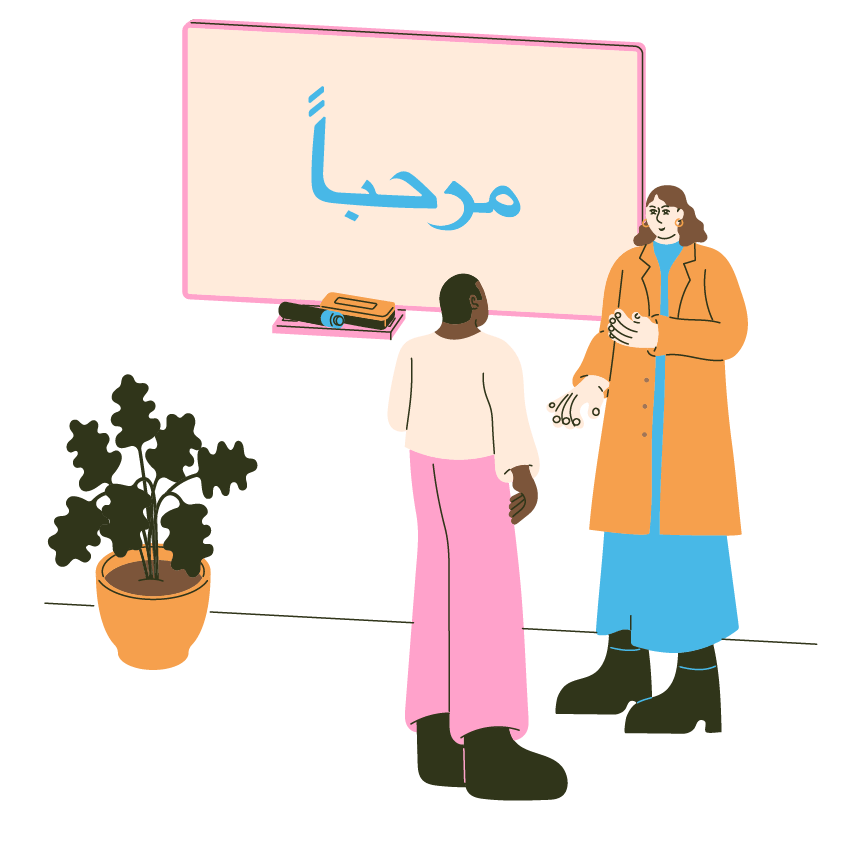This project focused on the provision of ESOL for Employability. It aimed to ensure a greater level of sustained support for refugees and other ‘New Scots’ to access and attend ESOL learning that focuses specifically on preparing learners for the workplace.
ESOL for Employability


Our project will serve to widen the impact of previous successful integration approaches, practices and tools by learning the lessons of these projects and adapting their approaches and resources to the specific needs and requirements of learners in Midlothian.
Our aim was to offer this project to all potential learners who might fall under the title of ‘New Scots’. We envisage that this would be broad in nature. This included many of the Syrian families who have arrived in Midlothian over the last few years. However, it also, clearly, includes new arrivals from different parts of the world.
Key Information
Geographical reach
Midlothian
Dates
28/09/2021 – 30/06/2022
Target Groups
Refugees, Asylum Seekers
Project Type
Spreading good practice
Background
In consultation with key workers, ESOL tutors and refugees themselves, it has become clear that one of the main priorities for refugees is to find employment as quickly as they can. The biggest barrier to achieving this is in having the language skills required to get into appropriate employment.
Whilst current provision of support and English classes certainly help towards this, we have only the capacity to deliver short weekly support sessions and language lessons. Added to this, Covid-19 restrictions have meant that this group have had even less opportunity to engage and integrate with the community and to develop their language skills outwith the home environment.
It is clear that the provision of fast track English lessons would make a big impact and extra funding would offer the opportunity to deliver more classes on a sustained basis. This would also enable us to deliver a specific course around ESOL for Employability. This brand new course would focus on appropriate language for the workplace and improve job seeking and employability skills. It will also help to raise awareness of employment opportunities that are available and broaden expectations of the types of work that this group can access – while breaking down some of the cultural barriers to accessing work in the UK.
Involvement of New Scots in project
We believe we did well to use the experiences and advice of our refugees to mould the direction of the different areas of the project. This was done by discussing and evaluating the course at the end of each 10-week term with the learners. We gathered feedback from them and used this to improve and develop on what we were delivering. For the more informal groups, like the Conversational and Women’s Groups, we try to make these learner-centred and use feedback from the learners to dictate content from week to week.
Impact
Overall, we were able to complete the main objectives of the project – which was to provide ESOL for Employability classes and to provide extra support for our Mainstream ESOL classes through new initiatives, which eventually took the form of more informal Conversational groups and a Women’s ESOL group. The Conversation Groups and the Women’s Group had not been exactly as originally planned, but in the end suited the needs of the learners better and were easier to implement logistically.
We would say that the project has brought about some of the changes we hoped for. It has allowed us the time and space to develop and deliver brand new resources for the Employability course, to review these and to change them as required. This will enable us to take the course ahead again in the future and enable us to offer something that we know is effective and that works well for our client group. It has also given us the opportunity to try out new classes with our learners that we have often discussed in the past but have not had the capacity to deliver. These are now integral to our ongoing ESOL offer.
The new courses developed and delivered as part of this project have proved that there is a demand for these opportunities and that they bring positive outcomes. As a result, we will use these in the future as part of our ongoing general ESOL provision and as part of our Employability strategy.

Challenges encountered
I think one of the most challenging areas of the project has been in the general administration of it. It has fallen largely on one person to stay on top of this on a very part-time basis, alongside broader ALN and ESOL responsibilities for the Council.
We had to deviate from ‘fast track’ classes as, in the end, it proved logistically difficult to put these in place alongside our existing ESOL provision.
Solutions
In retrospect we should have used the budget more wisely to bring in an administrator from the beginning who was able to focus on ensuring that this was dealt with more reliably and more efficiently.
We dealt with the deviation from ‘fast track’ classes by listening to the perceived needs of our learners and putting in place of the more informal conversation groups and the Women’s ESOL group
Reflections
We have learned the importance of providing more opportunities for ESOL learners in the community, out with mainstream ESOL classes. The opportunity offered to engage in more informal learning situations and to socialise and integrate with others in the community has been a rewarding experience for all of us involved, and one that we would certainly seek to maintain moving forward.
We’ve learned that there is a demand for the activities that we have put in place. Also, with these being new initiatives for us, we learned a great deal through the development of new materials, resources and delivery strategies. We found team teaching and bringing in external speakers on occasion worked especially well with the ESOL Employability course and we would certainly ensure that this is an integral part of the course in future.
We have also learned how best the conversation groups and the Women’s ESOL group can work through the experience of delivering them, from having the opportunity to try out different approaches and learning from our learners as we went along and evaluated at the end of each term.
We would certainly be more than willing to share our experiences with other organisations looking to implement similar initiatives in the future.
Further information
The resources and learning materials that we developed were entirely new to us as this is the first time that we have offered these courses as part of the Council’s overall service. As a result these will definitely be taken forward and used by us to further support refugee integration in the future.
Our experience of developing these courses and resources has been very positive. Although what we have delivered is not entirely unique to us, it has allowed us to be able to bring different ESOL staff together to work on these, to deliver them and to assess, evaluate and change them where required. The ESOL employability resources in particular will be shared more widely within the Council service to be used any other members of staff delivering employability courses.

